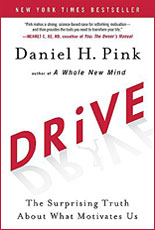Daniel H. Pink is the author of the bestselling A Whole New Mind, a former speechwriter for Al Gore, and a lecturer on economic transformation and the new workplace. In this ambitious book, he takes a hard look at what animates high performance and creates satisfaction in our lives and also discusses the three primary elements of true motivation.
Pink begins with a summary of the pioneering work of Harry Harlow, a professor of psychology, and Edward Deci, another psychologist, who made startling discoveries about human motivation. The first did experiments and research to come up with the motivation theory that the performance of a task can be its own reward. Deci went many steps further in a 1975 book and concluded that instead of the old higher pay incentive, many people have an "inherent tendency to seek out novelty and challenges, to extend and exercise their capacities to explore, and to learn." Drawing on four decades of scientific research, Pink challenges businesses and institutions of all types to partake in fresh strategies to boost performance.
The two traditional spurs to motivation were the biological drive and the reward-and-punishment drive. These two models — dangling a carrot in front of someone or wielding a sharp stick — are no longer viable. Pink lays out seven reasons why these two approaches are severely flawed:
1. They can extinguish intrinsic motivation.
2. They can diminish performance.
3. They can crush creativity.
4. They can crowd out good behavior.
5. They can encourage cheating, shortcuts, and unethical behavior.
6. They can become addictive.
7. They can foster short-term thinking.
External incentives are no longer the name of the game. A growing number of workers, says Pink, are seeking jobs that are creative, interesting, and self-directed.
With stout-hearted energy, the author covers experiments by diverse companies to boost performance and to address the human propensity to do something for its inherent satisfaction. These are presented under what he calls "the three elements of motivation — autonomy, mastery, and purpose." With ROWEs (the brainchild of Cali Ressler and Jody Thompson), companies allow employees to show up when they want and keep their own schedule; the only rule is that they get their work done. Another business encourages workers to spend up to 15 percent of their time on projects of their own making. Another technique that encourages self-motivation is "homeshoring" where customer service reps work at home and at their own pace. Other businesses are creating flow-friendly environments where the creativity and mastery of employees is encouraged. And still others are beginning to take seriously workers' needs to devote themselves to a cause larger than themselves; they are factoring this desire into their organizational life and policies with volunteer programs and the like.
In an unusual but impressive move, Pink has crafted a 70-page "Toolkit" at the back of the book consisting of Nine Strategies for Awakening Your Motivation; Nine Ways to Improve Your Company, Office, or Group; Nine Ideas for Helping Our Kids; Fifteen Essential Books; Six Business Thinkers Who Get It; and even a Fitness Plan for Those Want to Stay Motivated About Exercise. Pink gives a Twitter Summary of the Book: "Carrots & sticks are so last century. Drive says for 21st century work we need to upgrade to autonomy, mastery, & purpose."
